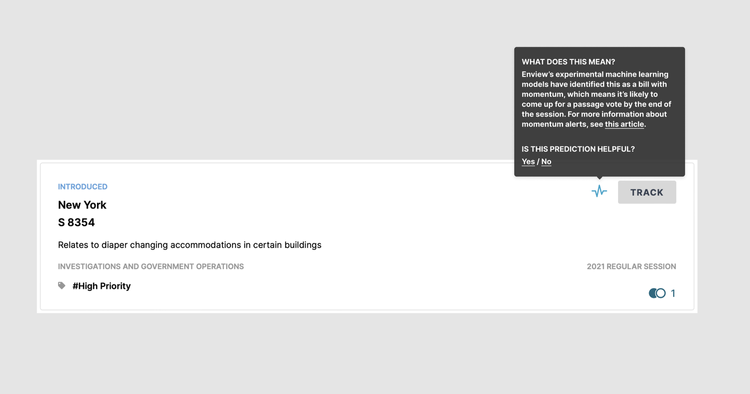AI is helping people identify which bills they should be focusing on and it’s changing the face of public policy work.
In any given session, organizations engaged in public policy advocacy may have to sift through hundreds of bills to identify important legislation that could potentially impact their particular work, cause, or agenda
Needless to say, it can be time-consuming and labor-intensive for public policy teams to determine which bills are likely to gain traction and ultimately come to a vote. Thankfully, legislative tracking software is evolving to keep up, with support from Artificial Intelligence (AI) to simulate human behavior and machine learning allowing programs to learn from past data and identify patterns.
Data is the raw material and AI is the tool that can allow public policymakers and government relations teams to generate more effective, targeted strategies to influence changes in public policy—and improve people’s lives. Not only can AI tools rapidly synthesize large amounts of data, detect patterns and identify opportunities, but the use of AI in public policy is poised to simplify policymaking and help shape public policy in the future.
How Legislative Intelligence Simplifies Public Policy Work
Using machine learning and drawing on historical data, Plural surfaces the bills that look most likely to come up for a passage vote at the end of a session. Once a bill is introduced, its patterns of movement correlate to its chances of passing. These patterns are different for every legislature and change over time—even in the course of a single session.
The machine learning model finds these patterns and makes predictions based on historical data from previous legislative sessions, including data points such as whether bills passed both chambers, the actions taken on those bills, and whether those bills were signed by executives.
To help you evaluate which bills to track and commit resources to, Plural released a new feature (currently in beta) that marks bills it believes are more likely to be put up for a vote by the end of the session with a pulse icon next to the “Track” button in search. You can also view the pulse icon on its bill card and its bill detail page.


How to Streamline the Bill Discovery Process
Until recently, public policy and government relations teams have had to visit many different websites to sift through each session’s legislation. Then, they manually gathered all of the relevant bills and pertinent language into lengthy spreadsheets, which they emailed to their team to collect their comments and determine next steps.
The machine learning built into Plural dramatically simplifies and speeds up this tedious but necessary bill discovery process.
Let’s say you’re part of a small public policy team relying mostly on interns or less experienced staffers to suss out what makes a particular piece of legislation worth following. Because bills with momentum are automatically flagged within Plural, it’s easy for someone less familiar with issue nuances to share it quickly with more senior decision-makers on your team. And if you’re the more experienced one? Having the ability to filter your search to include bills that have been flagged as having momentum will dramatically shorten the number of bills you have to review.
Waste Less Time on the Wrong Legislation
Technology in public policy-making is empowering public policy teams to make better, more informed decisions. Plural’s ability to identify bills more likely to come to a vote allows public policy professionals and advocates to be more strategic when choosing bills to pursue and deciding how much effort to allocate to bills when they start circulating within the legislature.
Of course, AI won’t replace the expertise it takes to influence policy. But by helping you speed up the process of identifying which bills matter most to your team, the technology will save the time you would spend on manual processes so you can spend it more strategically.
See how Plural flags bills with momentum
